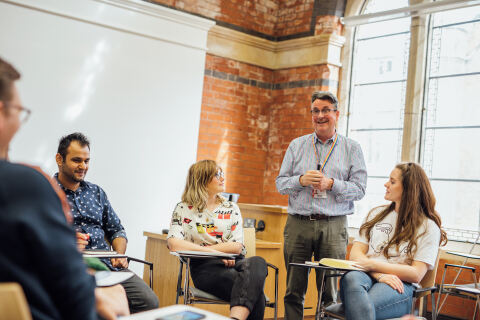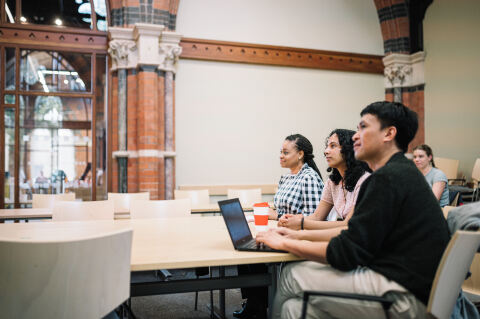Adapting to a New Learning Environment as an International Student
Law and Technology student Rushikesh provides a detailed guide to studying and learning techniques for international students at Queen's.

The pursuit of education often leads students across state lines and international borders, plunging them into entirely new academic and cultural environments. Whether transitioning from a local high school to a prestigious national university or travelling from one country to another to chase academic dreams, students frequently encounter diverse educational systems and learning styles.
Effective study techniques are not merely academic tools; they are essential skills that help manage these transitions by fostering understanding, retention, and application of knowledge in varied settings. However, what works for one student might not suit another, and techniques that are effective in one cultural context may need adjustments in another.
Why is it so important for students to learn and adapt to new study techniques?
Adapting to new study techniques is crucial as it enhances learning efficiency and comprehension by catering to diverse learning styles and needs. Keeping pace with technological advancements in educational tools can also provide significant advantages, helping individuals stay competitive in a rapidly evolving labour market.

Also by Rushikesh: Adapting to a New Academic Culture at Queen's University Belfast
Moreover, updating study methods supports lifelong learning, essential for sustained professional success and personal growth in today's knowledge-driven economy. Embracing innovative learning strategies is key to navigating the complexities of modern education and professional environments.
Educational Settings Across the Globe
Educational systems vary significantly from one country to another, influenced by local cultures, values, and governmental policies. For instance, East Asian countries like Japan and South Korea often emphasise rote learning and rigorous testing, which contrasts sharply with the discussion-based and critical thinking-oriented approach commonly found in Western educational institutions like those in the United States or the United Kingdom. Understanding these differences is crucial for international students who may need to adjust their study habits and expectations accordingly.
In Scandinavian countries such as Finland and Sweden, schools focus on learner autonomy and less formal, more collaborative classroom environments. This can be a shift for students from environments where classrooms are highly structured and teacher-directed. On the other hand, in countries like France and Germany, education might be more formal with a strong emphasis on mastery of content and direct instruction.
Impact of Cultural Differences on Learning
Cultural norms and values play a significant role in shaping learning styles and classroom interactions. For example, in many Western cultures, students are encouraged to participate actively in class discussions, challenge perspectives, and engage directly with instructors. Contrastingly, in many Asian and Middle Eastern cultures, educational practices are often more hierarchical, with a greater emphasis on respect for authority, which may discourage open debate and questioning of teachers.
These cultural nuances affect not only student participation but also peer interactions, the student-teacher relationship, and attitudes towards learning and failure. International students may need to learn to navigate these differences, which can impact their academic success and social integration.
Transition Challenges for National Students
Even within the same country, moving from one educational level to another or from one region to another can pose significant challenges. Students transitioning from high school to university often face a shift from structured, teacher-led environments to more independent learning contexts where self-motivation and self-directed learning are critical.

New to Queen's? Check out this guide by Rushikesh
Similarly, students moving between regions might encounter differences in dialect, cultural norms, or educational expectations that can affect their learning experience.
Core Study Techniques
Spaced repetition isn't just a study technique; it's a philosophy on how the brain captures and retains information over long periods. It works on the principle that our brains remember better when we revisit information periodically over time. Here's how you can turn this into a supercharged study habit:
- Customise Your Schedule: Use tools like Anki or Quizlet to create custom flashcards.
- Long-Term Project Learning: If you're tackling a big subject, break it into chunks and set milestones. For each milestone, use spaced repetition to ensure that earlier material remains fresh even as you add new information.
- Visual Aids: Combine this technique with visual aids like mind maps or charts, which can help in reinforcing memory by linking new knowledge with visual representations.

BLOG: Study Essentials - Top Tips From a Final Year Student!
Active recall transforms passive reading into an active interrogation of your memory. This approach forces your brain to strengthen neural pathways associated with the material, greatly enhancing recall:
- Self-Made Tests: After studying a topic, create practice questions that require you to recall definitions, processes, and frameworks without looking at your notes.
- Teaching Others: Try to teach the material to someone else without your notes. This practice is a form of active recall that reinforces understanding.
- Routine Check-ins: Schedule short daily sessions where you randomly test yourself on different segments of your study material. This randomisation helps prepare you for the unpredictable nature of exam questions.
The Feynman Technique is based on the idea that simplicity breeds understanding. Here’s how you can leverage this technique to deepen your learning:
- Write it Out: Start with a blank piece of paper and write down everything you know about a topic as if you were explaining it to a beginner. Use simple language.
- Identify Gaps: Whenever you stumble or hit a gap in your understanding, go back to your study materials to fill in the blanks, then simplify the concept again.
- Create Learning Guides: Turn your notes into a teaching guide or a simple blog post. Teaching is one of the most effective ways to solidify knowledge.

BLOG: My Experience of Writing My First Assignment
Tips for Application in Real-world Scenarios
Integration in Daily Life:
- Technology Integration: Use apps that integrate spaced repetition and active recall into your daily routine. For example, language learning apps like Duolingo use these principles to help you learn a new language effectively.
- Group Studies Enhanced: In group study sessions, take turns being the teacher, using the Feynman Technique to explain concepts to each other. This practice not only reinforces the material but also highlights different perspectives and understanding among group members.
- Peer Quizzes: Regularly set up quiz sessions with peers. These can be informal and cover a broad range of topics. The unpredictability of the questions can greatly aid in reinforcing learning through active recall.
By embedding these techniques into your study habits, you transform the way you learn, making it more engaging and effective. These methods don't just prepare you to pass exams; they equip you with the skills to master any new knowledge, ensuring you're not just learning but truly understanding and applying what you learn in real-world contexts.

BLOG: Top Group Study Spots at Queen's
Strategies for Undergraduate students
Advanced Integration:
- Activity-Specific Modifications: Depending on the cognitive demands of each task, modify the length of Pomodoro sessions. For tasks requiring intense focus and creativity, like writing essays, longer periods of concentration might be beneficial before taking a break.
- Pomodoro Extensions: For group projects or study sessions, adapt the technique to accommodate the group dynamics and collective focus capabilities, possibly extending each session to 35 or 40 minutes to accommodate deeper discussion and collaboration.
Methodical Implementation:
- Dynamic Scheduling: Beyond static time blocks, incorporate dynamic scheduling to adjust your daily or weekly calendar based on ongoing academic feedback and personal productivity rhythms.
- Integration with Academic and Personal Goals: Ensure that your time blocks align not just with academic requirements but also with personal development goals, such as learning a new skill or engaging in hobbies that contribute to mental health.
Strategic Planning:
- Micro-Tasking: Break down larger tasks into smaller, more manageable micro-tasks. This approach can make daunting assignments feel more achievable and less stressful.
- Priority-Based Flexibility: Employ a flexible but structured approach that prioritises tasks dynamically based on immediate academic pressures, feedback from professors, or personal commitments.
Community and Resource Utilisation:
- Digital Integration: Make extensive use of digital tools and platforms that connect you with local events and student groups, facilitating smoother cultural integration and community involvement.
- Proactive Resource Seeking: Regularly check for updates on university resources, workshops, and seminars that are specifically tailored to help new students acclimate to their surroundings.

BLOG: Third Year Advice for First Years: Navigating December Assignment Season
Strategies for Postgraduate students
- Customising the Pomodoro Technique for Research Intensity
Focused Application:
- Research Phase Alignment: Adjust the length of focus periods to align with different phases of research—longer Pomodoro’s for data analysis and shorter for literature review, depending on the intensity and nature of the task.
- Break Quality Enhancement: Use breaks strategically to perform light physical exercises, mindfulness practices, or even engage in casual peer discussions to foster creativity and reduce research fatigue.
- Mastering Time Blocking Amid Complex Schedules
Comprehensive Organisation:
- Research Milestone Planning: Incorporate major research milestones into your time blocks at the semester or yearly level, and adjust weekly and daily blocks to progressively advance towards these larger goals.
- Contingency Planning: Build in contingency time blocks weekly to catch up or re-prioritise tasks that were unexpectedly delayed or extended.
- Developing an Adaptable Study Schedule
Feedback-Driven Adjustment:
- Iterative Refinement: Regularly revise your study schedule based on iterative feedback from academic advisors and peers, integrating new insights or adjustments to research methodologies.
- Balanced Workload Distribution: Plan for periods of high academic workload interspersed with lighter weeks, allowing time for recovery and reflection, which is crucial for sustaining long-term productivity.

BLOG: How Different is Postgraduate Study from Undergraduate Study?
- Navigating New Academic and Cultural Environments
Deep Cultural Engagement:
- Cultural and Academic Enrichment: Actively participate in cross-cultural training and academic enrichment programmes offered by the university to better understand and integrate into the academic community.
- Strategic Networking: Develop a strategic approach to networking by identifying key faculty, industry leaders, and peer researchers who align with your academic interests and career goals.
Essential Educational Apps for Enhanced Learning
The array of educational apps available today can significantly enhance the learning experience for students by providing organised study tools, fostering collaboration, and overcoming language barriers. Here is a detailed exploration of some of the most effective apps across various categories of educational needs:
Organisational and Note-Taking Apps
- Evernote: A versatile app that allows students to organise their coursework and personal notes effectively.
- Notability: Ideal for students who prefer handwritten notes, Notability offers extensive note-taking capabilities, including PDF annotation and multimedia notes.
- Todoist: This task management app helps students keep track of their assignments and deadlines through an intuitive interface.
- Obsidian: Graduate and postgraduate students can greatly benefit from using Obsidian, a versatile note-taking and knowledge management app that excels in organising complex information.
Tip - My favourite is Obsidian, because it’s free, and extremely useful. You can even visualise data sets and interconnect them with each other.

BLOG: Top Apps for Getting Organised!
Productivity and Focus Apps
- Forest: Designed to keep students off their phones and focused on their studies, Forest rewards users by growing a virtual tree which flourishes as the user remains focused.
- Calm: Supports the mental and emotional well-being of students with guided meditations, sleep stories, and mindfulness exercises, essential for managing stress and anxiety related to studies.
Collaboration and Communication Platforms
- Google Classroom: This app streamlines the process of managing and distributing assignments, fostering better communication and collaboration between students and educators.
- Remind: A communication platform perfect for real-time interaction between students, teachers, and parents.
Educational Content and Revision
- Quizlet: Known for its flashcard-based learning system, Quizlet allows students to create and use flashcards for effective revision and memorisation, supporting both individual learning and group study sessions.
- SparkNotes: An essential resource for literature students, offering study guides and summaries for a vast array of literary works.
Specialised Learning Tools
- Mathway: This app provides step-by-step solutions to mathematical problems, from basic arithmetic to advanced calculus and beyond, making it an invaluable resource for students struggling with math.
- edX: Offers online courses from some of the world's leading universities, making higher education more accessible to students globally. While courses are free, certifications may require a fee.
Specialised Educational Support
- Chegg Study: A comprehensive learning platform that offers textbook solutions, expert Q&A sessions, and online tutoring to help students understand and master different subjects, making it a valuable resource for homework help.
Find out more about Rushikesh's course
Additional Learning Resources
- Newsela: Provides engaging, level-adjusted content for students to improve reading comprehension skills, with real-time assessments to track progress and adapt difficulty levels accordingly.
- Brilliant: Focuses on problem-solving and critical thinking with interactive challenges in math and science, fostering a deeper understanding of complex concepts through active learning.
Health and Well-being Strategies for Enhanced Academic Performance
The relationship between a student’s health and their academic performance is profound and multifaceted. Ensuring good physical, mental, and emotional health can dramatically improve learning outcomes and overall life satisfaction.
Cognitive Benefits:
- Enhanced Concentration and Focus: Regular physical activity increases blood flow to the brain, which can help sharpen attention and readiness to learn. Exercise also stimulates neurogenesis, the growth of new brain cells, enhancing cognitive functions across the board.
- Stress Reduction: Physical activities reduce levels of the body's stress hormones, such as adrenaline and cortisol. Simultaneously, they stimulate the production of endorphins—chemicals in the brain that are the body's natural painkillers and mood elevators.
Nutritional Impact:
- Brain Function: Nutrients like omega-3 fatty acids (found in fish and flaxseeds) and antioxidants (found in fruits and vegetables) enhance brain function and protect brain cells.
- Mood Stabilisation: Consistent nutritional intake helps stabilise mood, clarity of thought, and energy level, which are crucial for managing the academic workload.
Stress Management Strategies
Exercise as a Routine:
- Variety in Exercise: Incorporating a mix of cardiovascular exercises, strength training, and flexibility workouts can cater to overall health, thus avoiding the monotony of a single type of exercise.
- Group Activities: Engaging in group sports or fitness classes can also add a social element to exercise, making it more enjoyable and sustainable.

Read more blogs about Wellbeing and Support at Queen's
Advanced Nutritional Approaches:
- Meal Planning: Preparing and planning meals ahead can help ensure a balanced intake of nutrients crucial for brain function and energy levels.
- Hydration: Drinking adequate water has a significant impact on concentration and cognitive function.
Mindfulness and Mental Resilience:
- Regular Practice: Incorporating daily or weekly sessions of mindfulness practices can help build resilience to stress.
- Technology Aids: Utilising apps that guide meditation and mindfulness exercises can make these practices more accessible and engaging.
Support Services
- Queen’s Mental Health Services: Regular check-ins with mental health professionals can provide students with strategies to manage stress and deal with academic pressures.
- Academic Advisors: Regular meetings with academic advisors can help students navigate their educational paths and prevent overwhelming situations.
Practical Applications for Daily Academic Life
Goal Setting and Achievement:
- SMART Goals: Setting Specific, Measurable, Achievable, Relevant, and Time-bound (SMART) goals can help students keep track of their progress and maintain motivation.
- Reflection: Regular reflection on what methods are working and what aren’t can help refine goals and strategies effectively.
Integration of Breaks and Leisure:
- Scheduled Downtime: Integrating scheduled breaks within study times can prevent fatigue and enhance long-term retention of information.
- Hobbies and Interests: Encouraging students to pursue hobbies and interests outside academics can provide necessary breaks and mental relaxation.
Check out Ghada's top tips for dealing with exam/study stress
Optimising Sleep:
- Sleep Schedule: Maintaining a consistent sleep schedule helps regulate the body’s clock and can help you fall asleep and wake up more naturally.
- Quality Sleep Environment: Ensuring a dark, quiet, and cool environment can significantly improve the quality of sleep.
Tailoring Study Techniques to Individual Needs
Understanding and adapting to individual learning styles and preferences is crucial for maximising academic performance.
Assessing Learning Styles
- Identifying Your Learning Style:
- Visual Learners: If you find it easier to understand information through diagrams, charts, and written directions, you're likely a visual learner.
- Auditory Learners: Auditory learners prefer listening and can absorb more information through lectures, discussions, and audio recordings.
- Kinaesthetic Learners: If you learn best by doing, touching, and experiencing directly, you fall into the kinaesthetic learning category.
- Tools for Assessment:
- Utilise online quizzes and assessments to determine your predominant learning style. These tools evaluate your responses to various scenarios to suggest the most effective learning strategies for you.
- Adapting Study Techniques:
- Visual Learners: Integrate colours in notes, use mind maps, and watch videos related to the topics.
- Auditory Learners: Participate in group discussions, use mnemonic devices, and listen to recorded lectures.
- Kinaesthetic Learners: Engage in hands-on activities, use models or physical objects for learning, and take frequent breaks to move around.
.jpg)
Integrate colours in notes
Customising Study Environments
- Evaluating Environmental Preferences:
- Some students require complete silence to concentrate, while others thrive in a bustling environment with background noise.
- Adapting Your Space:
- Quiet Environments: Set up a dedicated study space in a quiet room. Consider noise-cancelling headphones to block out distractions.
- Dynamic Spaces: If ambient noise is beneficial, try studying in coffee shops, libraries with designated talking areas, or at home with background music.
- Organisational Tools:
- Use apps like Trello or Asana to organise tasks and manage projects efficiently. These tools are beneficial for setting priorities and keeping track of deadlines.
Experimentation with Different Methods
- Trial and Error: Experiment with different study methods over a period to find what best suits your learning style. For example, try flashcards, summarising texts, teaching the material to others, or creating visual aids.
- Feedback and Adjustment: Seek feedback on your performance through quizzes, practice tests, and assignments. Adjust your study methods based on what increases your understanding and retention of material.
- Incorporate Technology: Leverage educational technology tools that align with your learning style. For instance, Quizlet for flashcards, Khan Academy for interactive lessons, or Audible for audiobooks.
- Balancing Flexibility and Structure: While it’s crucial to have a structured study plan, remain flexible to adapt strategies as you discover more about your effective learning habits over time.
Follow Kathryn on a typical study session!
Starting to use new study techniques is inherently challenging, but it's a progressive journey. The difficulty of beginning and maintaining a new routine shouldn't be underestimated; persistence is crucial. It took me months to find the study techniques that worked best for me. However, once these techniques are mastered, they not only become easier to apply but also evolve into a form of muscle memory.
Find out more
Develop your digital learning skills
VIDEO: Revision Weekend at Queen's
BLOG: My Experience of Writing My First Assignment
Rushikesh MahajanLLM Law and Technology | Postgraduate Student | IndiaI am a Postgraduate student specialising in LLM Law and Technology at Queen’s University Belfast. I have a strong interest in digital services and technology. I come from a legal background where majority of emphasis was given on reading. I like to cook, play video games and talk to people. As a solicitor I like to learn about people and provide them solution. |
 |